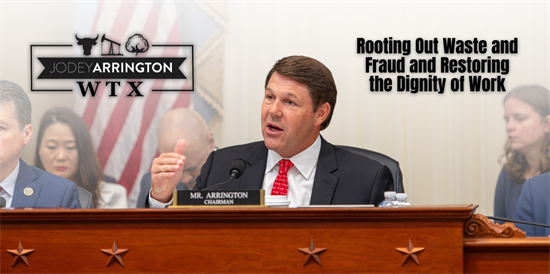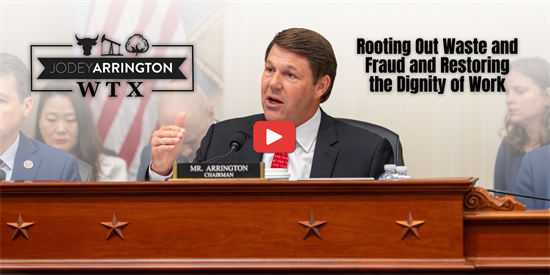WASHINGTON, D.C. – Today, House Budget Chairman Jodey Arrington (TX-19) delivered opening remarks at his hearing entitled,
“Reversing the Curse: Rooting Out Waste and Fraud and Restoring the Dignity of Work.”
|
Watch Chairman Arrington’s Opening Remarks HERE |
Opening Remarks as Prepared:
This Committee convenes today to examine one of the most pressing fiscal and moral challenges facing our nation and the historic opportunity before us to fix it.
The first order of business in addressing Washington’s unsustainable spending and the looming debt crisis that hangs over our country, is the unchecked growth of waste, fraud, and abuse in our nation’s entitlement programs. It is money taken from taxpayers and spent in ways that not only violate the laws, but common sense while undermining the promises made to the most vulnerable Americans.
In Washington, promises to tackle waste have become like New Year’s resolutions—loudly proclaimed and quietly abandoned – and both parties are guilty of that.
The cost of this inaction is quite staggering.
One major driver of this problem is what the Government Accountability Office categorizes as improper payments: payments that were wrongly made or were made in the wrong amount.
Last year alone, the GAO identified $31 billion in Medicaid improper payments. That is nearly equal to the state budgets of Arkansas, Delaware, Idaho, Vermont, New Hampshire, and South Dakota combined.
In Medicaid, improper payments are often the result of a costly combination of lax oversight and blatant fraud: unverified documents, false income claims, and missing household information that never gets flagged or fixed.
In the Supplemental Nutrition Assistance Program—which provides food assistance to nearly 42 million people—GAO identified $10.5 billion in improper payments for an error rate of 11.7 percent.
In SNAP, state governments frequently fail to check for basic eligibility criteria—whether it’s citizenship, finances, employment, or even someone’s identity.
When the system is susceptible to fraud, the fraudsters gladly seize on that vulnerability.
In Baltimore, a dozen store owners stole $16 million by trafficking SNAP benefits through fake retail transactions. In New York, a government worker used SNAP benefits to buy energy drinks and resell them to corner stores, pocketing over $1.8 million. And in Florida, a couple used nearly 700 stolen identities to obtain SNAP cards and swap them for cash at a corrupt retailer.
These are not isolated incidents. They are symptoms of a system with inadequate guardrails and vulnerabilities that invite fraudsters to siphon funds away from those the program was intended to serve.
Through the One Big Beautiful Bill Act, the House has advanced reforms to restore accountability and ensure our entitlement programs actually serve the vulnerable, not schemers.
Importantly, the bill addresses some of these issues by:
- Ensuring illegal immigrants don’t get a dime in social services and protecting safety net programs for the most vulnerable American citizens;
- Preserving and strengthening Medicaid by enhancing enrollment verification and ensuring only those who are legally eligible, receive benefits;
- Reining in state financing gimmicks like provider tax schemes meant to siphon away federal Medicaid dollars; and
- Capping excessive state-directed payments that artificially inflate costs.
The House-passed One Big Beautiful Bill restores the dignity of work itself—a moral imperative for the prosperity in this country. Able-bodied adults without dependents will be required to work, volunteer, or pursue education or training for at least 80 hours per month total—with, of course, common-sense exemptions.
That’s less than a part-time job, and it reflects the basic belief that public assistance should serve as a bridge to self-sufficiency, and not as a long-term substitute for work.
The House-passed reforms to SNAP will close loopholes that have allowed states to completely waive work requirements in states like California, Illinois, and Nevada; end accounting gimmicks, encourage work and self-sufficiency, and ensure benefits go to those Americans who truly need them—not those gaming the system. This will generate nearly $300 billion in savings—without taking a single penny from eligible Americans.
On our current trajectory, our debt will reach $150 trillion by 2055. By any measure, this is unsustainable.
Interest payments and debt will crowd out other federal spending, making it impossible to respond to the challenges future generations of Americans will face.
The One Big Beautiful Bill takes a meaningful first step to right size our bloated bureaucracy by reining in reckless spending that’s driving our nation deeper into debt. That’s why it's crucial my Senate colleagues only consider changes that further strengthen our fiscal reforms so we can quickly deliver on our promise to Make America Great Again.
Today, we are fortunate to be joined by three distinguished experts:
- Brian Blase, President of Paragon Health Institute;
- Nick Stehle, Vice President of Communications at the Foundation for Government Accountability; and
- Matthew Dickerson, Director of Budget Policy at the Economic Policy Innovation Center.
Both current and future generations deserve better than broken systems and hollow promises. They deserve real accountability—programs that work and that help people find work and opportunity. That’s exactly what the One Big Beautiful Bill delivers.
With that, I yield five minutes to the Ranking Member.
###



